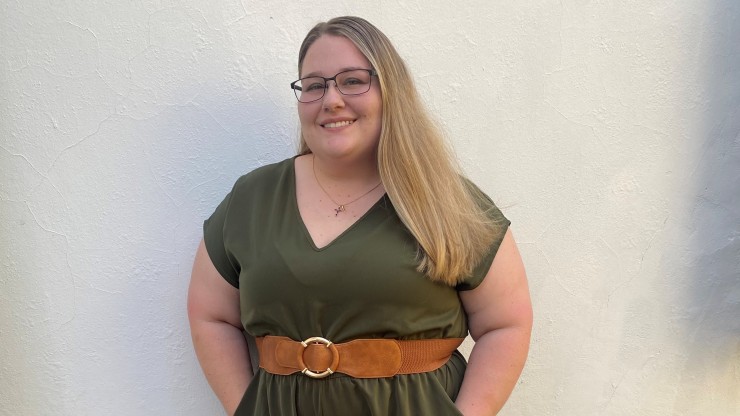Michele Sessa ’19 is Finding Purpose Through Connection

Dean College alumna, Michele Sessa, has followed a path shaped by empathy, resilience, and a desire to help others. Now a licensed social worker providing therapy to children, families, and individuals across Massachusetts, she reflects on how her time at Dean laid the foundation for a meaningful and rewarding career.
Discovering her Passion at Dean
For Michele, choosing to study psychology at Dean was more than an academic decision. It was about the people. From the moment she stepped on campus at orientation, she was able to connect with faculty about her goals.
“I was inspired by the passion, expertise, and genuine care shown by the professors and staff from the very beginning,” she says. “Dr. Randy Reno, professor of psychology, and Dr. Kristin Holster, professor of sociology, immediately stood out to me not only for their deep knowledge, but also for their commitment to student success.”
Classes taught by Dean’s esteemed faculty left a lasting impression on Michele. Whether it was developmental psychology, sociology, or research methods, her professors encouraged a hands-on, multidisciplinary approach to understanding human behavior.
“I didn’t always know I wanted to become a therapist—my path evolved over time,” she explains. “As a child, I dreamed of becoming a pediatrician because I knew I wanted to help people, especially kids. But the more I learned about psychology, the more I saw how therapy aligned with my core values—empathy, connection, and meaningful impact. Choosing to pursue therapy felt like a natural evolution of that original desire to help others, just through a different and equally powerful path.”
Finding her Community at Dean
Reflecting on her Dean experience, Michele shares, “What I liked most about attending Dean was the strong sense of community. It truly felt like a place where I belonged.”
Michele was recruited to play softball at Dean, which she noted provided her with an immediate support system and helped her build lifelong friendships. She also found community through the learning support services available through the Morton Family Learning Center, like academic coaching, writing, and math support.
“Knowing that kind of safety net existed made a big difference in my confidence as a student,” she says.
A Career Centered on Connection
After obtaining her master’s degree in social work at Simmons University and working in community health for several years, Michele made the decision to transition into private practice. Today, as a Licensed Certified Social Worker (LCSW), she provides outpatient therapy at Transitions Counseling Services, Inc. in Franklin, MA.
Her week is typically split between office-based therapy and school-based sessions, where she supports elementary school students in their day-to-day environments.
“I see between 30 to 40 clients a week, including children, teens, adults, and families,” Michele says. “Each day is a little different, and I love the variety. It keeps me engaged and always learning. I find the work incredibly rewarding, especially the opportunity to build long-term therapeutic relationships.”
Michele’s clinical work covers a wide range of issues, including anxiety, trauma, ADHD, autism spectrum disorders, mood disorders, and gender-affirming care. Her approach is flexible, trauma-informed, and relationship-centered.
“I’m especially passionate about working with children and families. Helping caregivers feel supported and confident is such an important part of what I do,” she explains.
In the next few years, Michele plans to earn her Licensed Independent Clinical Social Worker (LICSW) credential, which will enable her to expand her scope of practice and offer supervision to other social workers. She’s also interested in pursuing advanced training in trauma-informed care and family systems therapy and hopes to eventually establish her own private practice.
Through it all, her core values have remained the same: connection, advocacy, and meaningful support.
Practicing What She Teaches
Working in mental health care can be emotionally demanding, but Michele is intentional about her own self-care.
“I maintain strong boundaries around my schedule and make time to recharge—whether that’s spending time in nature, being with loved ones, or just taking a quiet moment for myself,” she shares.
She even brings these habits into her therapy sessions. “By modeling self-care and emotional regulation with my clients, I reinforce those practices for myself, too.”
Her advice to current psychology majors? Stay open, curious, and grounded, and give yourself room to explore. She recommends taking advantage of every opportunity to learn through classes, internships, volunteer roles, and networking opportunities.
“You don’t have to have everything figured out right away,” she says. “Real-world experience will help guide your path. And most importantly, take care of yourself. Therapy is meaningful and emotional work, and the most effective therapists are those who know how to set boundaries, ask for support, and model self-care. Building those habits early will serve you well throughout your career.”
A Lifelong Connection to Dean
“There’s something special about the Dean Difference,” Michele says. “Professors know your name, staff genuinely care about your success, and you’re encouraged to grow as a whole person.”
Even after graduation, Michele has remained closely connected to Dean and continues to give back by participating in alumni panels, events, and mentoring.
“I stay in touch with professors who were influential in my journey,” she says. “Their mentorship means a lot to me—and I want to offer that same support to current students. Dean helped shape who I am, and I’m proud to stay part of this community.”
